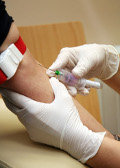Diabetes Treatment and Diagnosis
Author: tiger Published Under: Health

In the United States and other Western Counties, diabetes is becoming increasingly common. Diabetes Mellitus is a disease that affects the way the body processes and uses glucose. Glucose, which is a type of sugar, is used as one of the bodies chief sources of energy and is broken down by a hormone called Insulin.
There are two types of diabetes and in Type I diabetes, the body does not produce an adequate supply of insulin or in some cases does not produce any insulin at all. In Type II Diabetes, the body develops a resistance to insulin.
Diabetes Diagnosis
Typically, diabetes is diagnosed when an individual notices the symptoms of diabetes, which include excessive urination and dry mouth, and goes to see the doctor. The doctor will preform a blood glucose test and a high level of glucose, is usually found. Once diagnosed with diabetes, there are a number of treatments available, but rarely is there a cure.
Diabetes Treatment
The type of treatment used will typically depend on the type of diabetes that is present. However, the goal, which is to maintain a constant and healthy level of glucose, is the same for both Type I and Type II diabetes. This typically involves taking regular blood sugar readings and acting when the blood sugar is too high or too low.
Treating Type II Diabetes
For those with Type II diabetes, which is where the body becomes resistant to insulin, diet and exercise are often the first line of defense. Obesity is much more common among those with Type II Diabetes, so often maintaining a healthy diet can be very difficult.
A healthy diet includes avoiding foods that are high in fats. It is also important to try to get as much energy as possible from carbohydrates, like bread and pasta, and avoid foods with lots of sugar. A fixed calorie intake is required and a balance maintained between fats and carbohydrates
There are also a number of medicines and injections available to treat Type II Diabetes, which help make the bodies cells process insulin. Treatment of Type II Diabetes usually begins with oral medicines, like sulphonylureas, which helps force the body to release more insulin. Metformin is also used, which makes the bodies tissues better able to absorb glucose. Other medicines, like acarbose, which slows glucose absorption in the intestine, are also available, but they can become ineffective over time, in which case insulin shots will be required.
Typically this treatment will be lifelong and daily blood sugar tests, which are self administered, will be required.
Treating Type I Diabetes
For Type I Diabetes, insulin injections are the most common form of treatment. This is because among those with Type I diabetes, the body is not producing enough insulin or might not be producing any at all. As a result, the insulin shots are required to allow the glucose to be broken down.
There are two types of insulin, long-acting and short-acting, which are typically used in combination, depending on the individuals blood sugar levels. The injections can be done by the individual, as will the daily blood sugar monitoring. It is also very important to maintain a healthy diet and regular exercises.
In some cases, an insulin pump will be implanted in the patient. This draws insulin from a reservoir and dispenses it to the body as needed. An insulin pump is often worn, with a catheter inserted into the individuals skin.
In extreme cases, a pancreatic transplant can be done, although this is seldom used, because it is very dangerous and there is a high risk of rejection. Medicine will also be needed to prevent the rejection. In instances where a kidney transplant is preformed, a pancreatic transplant will also sometimes be preformed.
There are also a number of research projects currently being developed, which are aimed at rebuilding the insulin producing pancreatic cells. These often use stem cells and there have been several successful experiments in mice where the pancreatic cells were rebuilt. It will be sometime before this treatment is ready for humans though.
If a persons blood sugar is properly monitored on a daily basis and a healthy diet maintained, most people with diabetes will be able to live a normal life. However, there are a number of complications, like cardiovascular disease, kidney failure, and high blood pressure, which can be caused by diabetes if left untreated.